Caesar Sails Back to Gaul
£3.00
Julius Caesar has just fought the Britons and won. This lesson recaps his invasion in 55 BC and then explains what happened after the Romans had beaten the Britons. The Britons had to agree to pay Caesar a tribute and provide hostages before he was prepared to return to Gaul.
As well as English (writing a report) and history skills the Evidence-Based Learning skills developed in this lesson include independent learning and thinking skills. This lesson also offers pupils the opportunity to master peer assessment.
Description
Each evidence-based learning (EBL) Roman history resource in this set is a complete lesson which uses the history curriculum as a framework through which each of the eight EBL skills can be mastered. Each resource has “mastering” one EBL skill as its central focus and all eight EBL skills are covered more than once in these lessons.
All eight EBL skills are better gained working with a partner so much of the work in these lessons is collaborative. These resources will ensure that pupils can master and use EBL skills regardless of their ability.
Each Roman history lesson will develop a single EBL skill through:
1) A “Before You Start” page that introduces the EBL skill.
2) Opportunities to master this skill during the lesson.
3) An “After You Finish” page that offers pupils the chance to evaluate their learning experience (of the lesson and the EBL skill) and to identify their next step in using the EBL skill.
The skills in bold below are all the EBL skills developed in this Roman lesson. Click on each skill to learn more about that skill.
- Collaboration
- Thinking Skills
- Peer Assessment
- Peer Teaching
- Self-Assessment
- Metacognition
- Self-Regulation
- Independent Learning
1 review for Caesar Sails Back to Gaul
Only logged in customers who have purchased this product may leave a review.
Related products
-


Caesar’s Dog Goes on Holiday
£3.00 Add to basket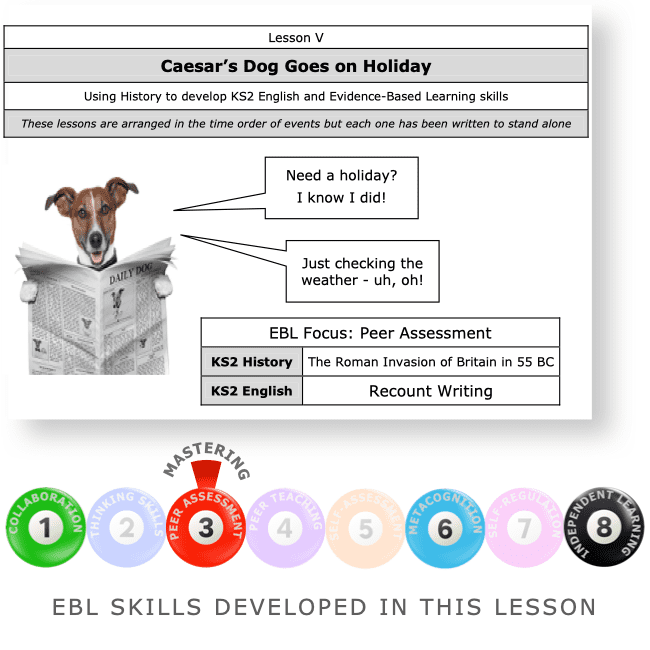 £3.00Add to basket
£3.00Add to basketThis lesson offers a light-hearted look at Caesar’s first invasion of Britain in 55 BC from the perspective of his (imaginary) dog called Rexus. Rexus is not invading of course – he is going on holiday!
As well as English (writing a recount with a partner) and history skills the Evidence-Based Learning skills developed in this lesson include collaborative learning, independent learning and metacognition. This lesson also offers pupils the opportunity to master peer assessment.
VIEW -


Caesar’s Parrot Enjoys an Awayday
£3.00 Add to basket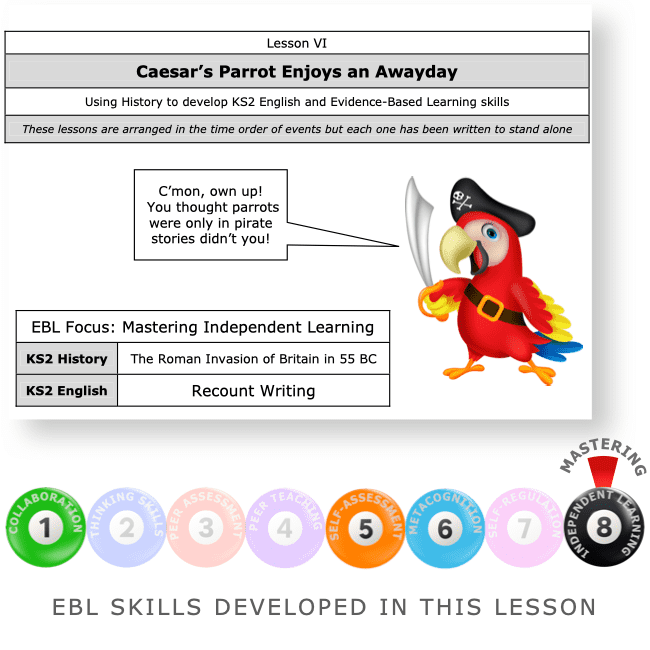 £3.00Add to basket
£3.00Add to basketThis lesson offers a light-hearted look at Caesar’s first invasion of Britain in 55 BC from the perspective of his (imaginary) parrot called Capitano. Capitano is not invading of course – he is going on an awayday!
As well as English (writing a recount on their own) and history skills the Evidence-Based Learning skills developed in this lesson include metacognition and self-assessment. This lesson also offers pupils the opportunity to master independent learning.
VIEW -

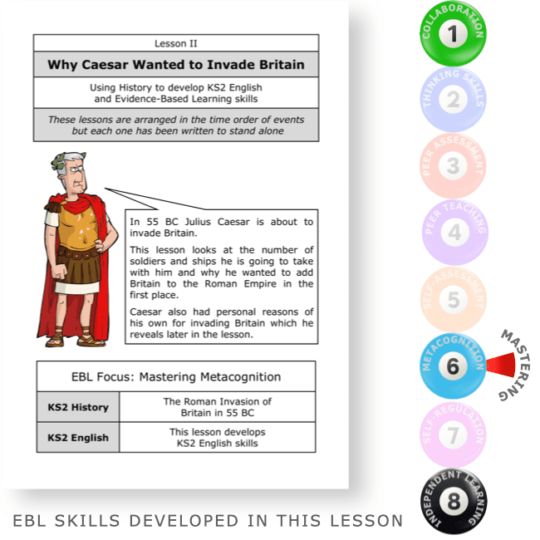
Why Caesar Wanted to Invade Britain
£3.00 Add to basket £3.00Add to basket
£3.00Add to basketIn 55 BC Julius Caesar is about to invade Britain. This lesson looks at the number of soldiers and ships he is going to take with him and why he wanted to add Britain to the Roman Empire in the first place. Caesar also had personal reasons of his own for invading Britain which he reveals later in the lesson.
As well as English and history skills the Evidence-Based Learning skills developed in this lesson include collaborative and independent learning. This lesson also offers pupils the opportunity to master metacognition.
VIEW -
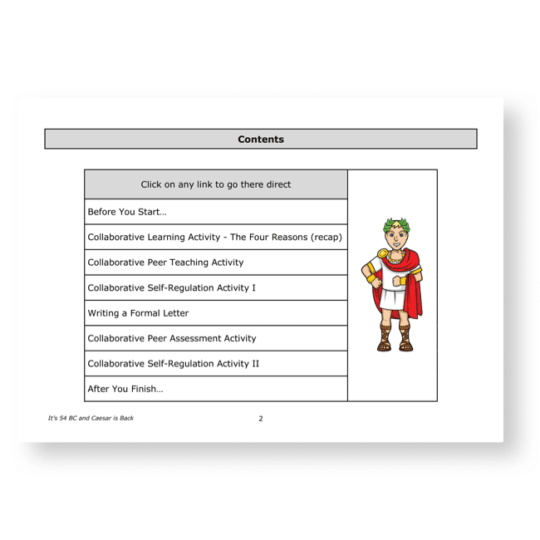
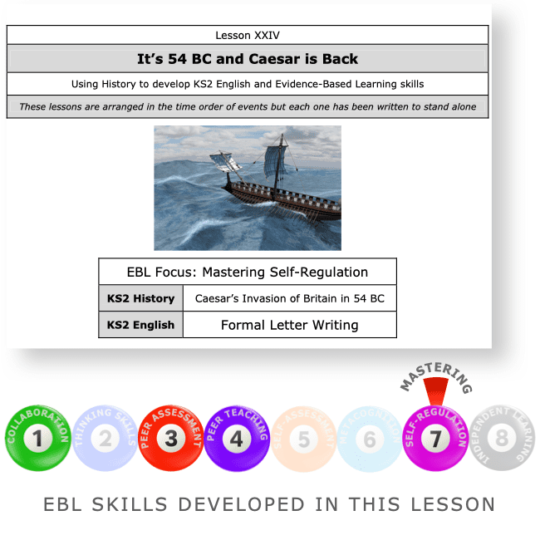
It’s 54 BC and Caesar is Back
£3.00 Add to basket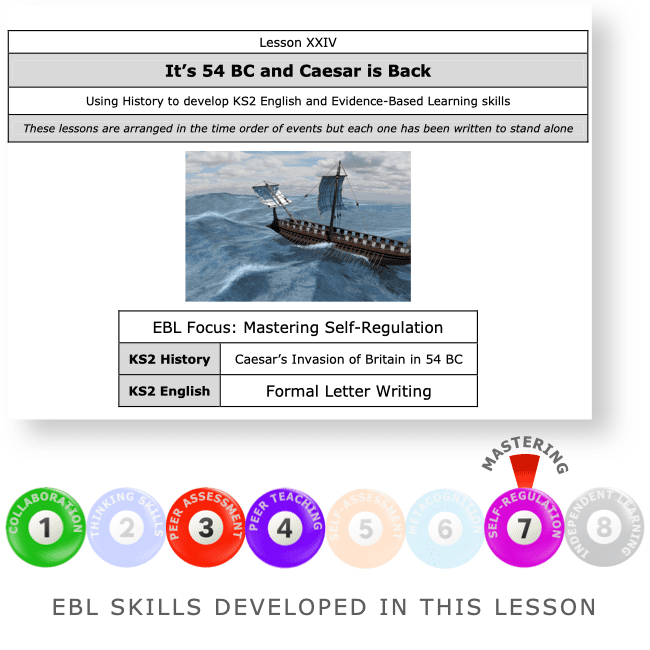 £3.00Add to basket
£3.00Add to basketThis lesson uses the mechanism of a formal letter to explore the fact that although Caesar’s first invasion in 55 BC was a failure, his second invasion a year later in 54 BC was a success. This lesson also considers why invading Britain was extremely important for Caesar and for the Roman Empire.
As well as English (writing a formal letter) and history skills the Evidence-Based Learning skills developed in this lesson include collaborative learning, peer teaching and peer assessment. This lesson also offers pupils the opportunity to master self-regulation.
VIEW

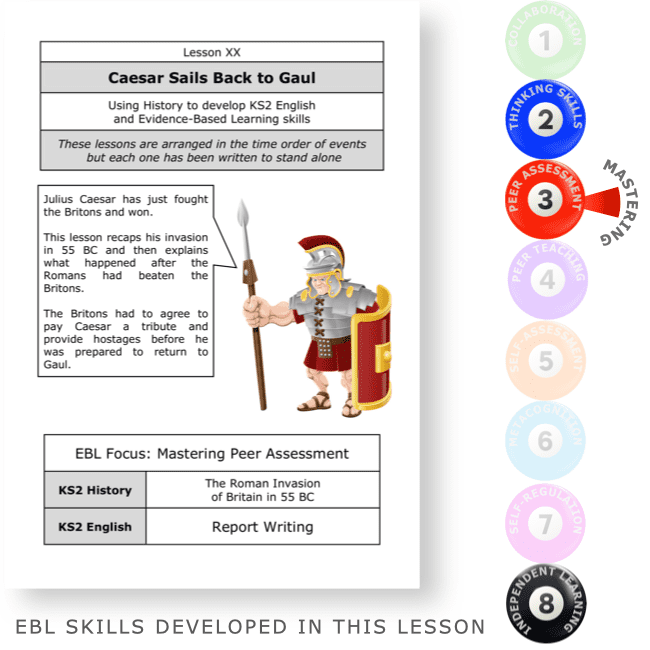
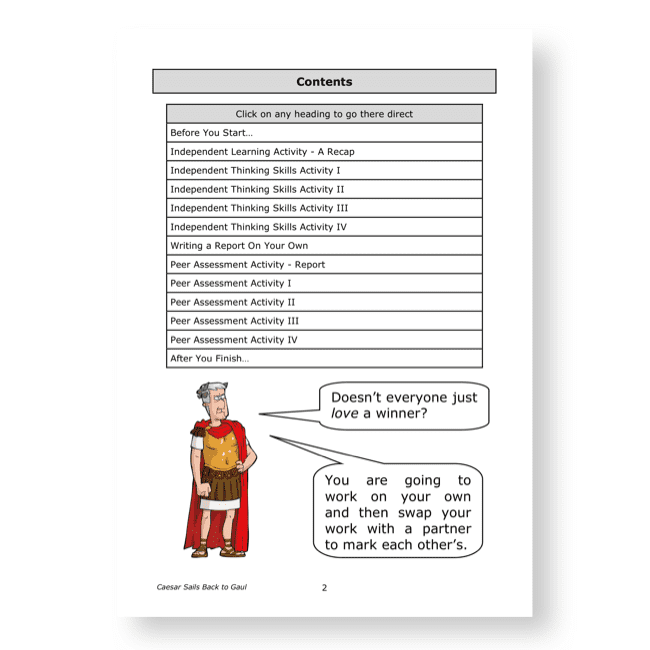
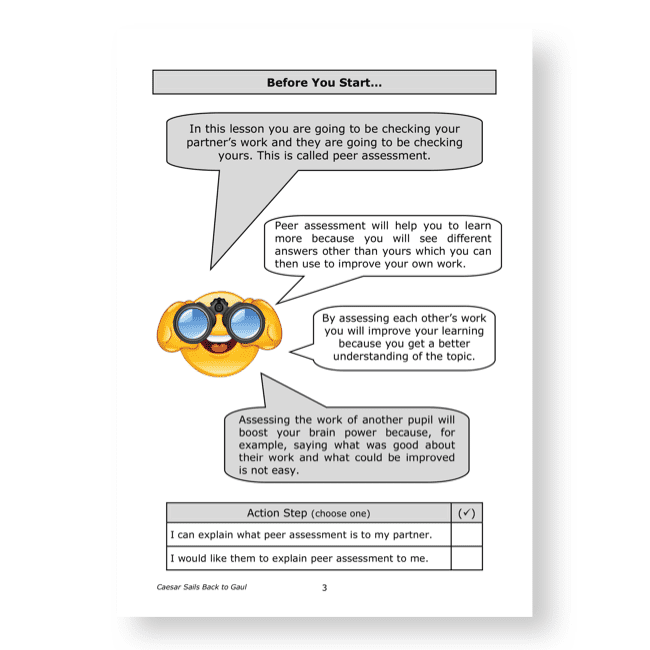
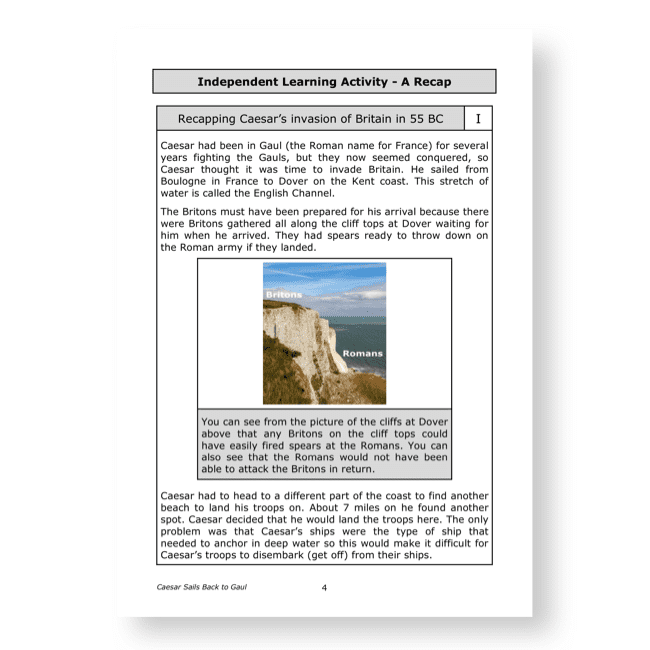


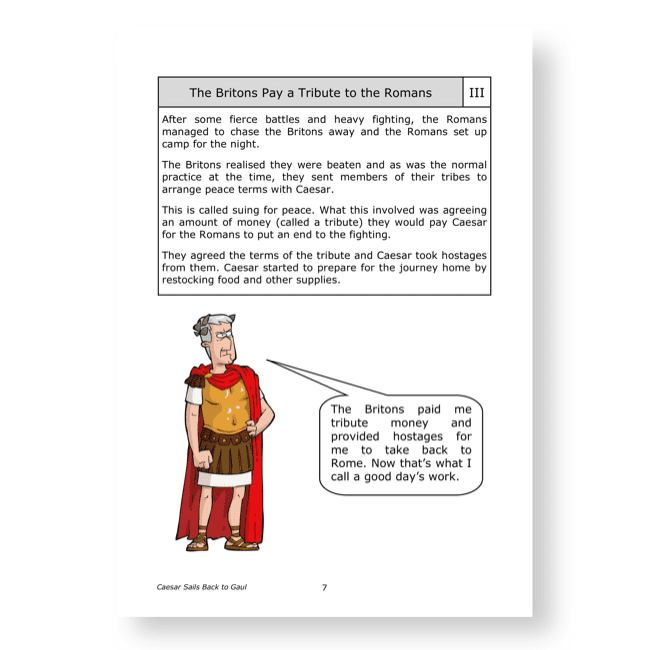
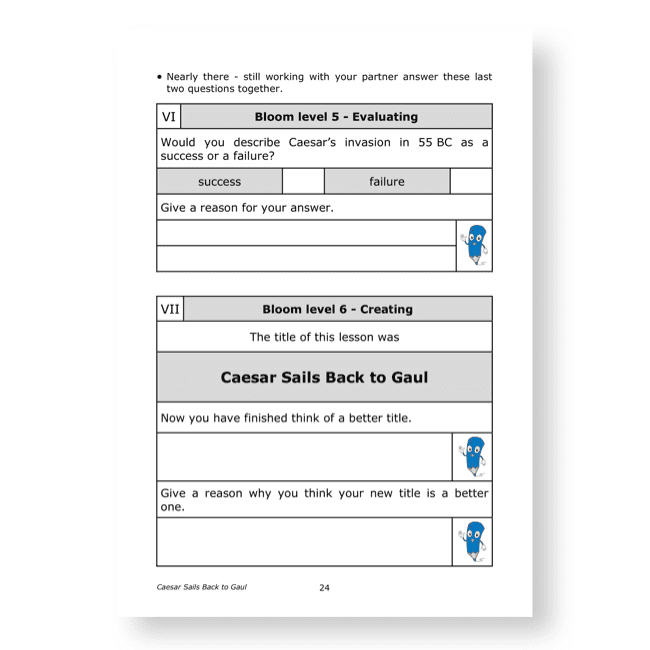
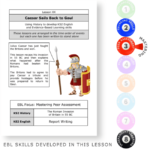
Philipem (verified owner) –
We asked a.i. to review this lesson. This is what it said:
Immerse Your Students in Caesar’s Invasion with Engaging Learning Activities
Are you searching for a captivating way to teach your upper KS2 students about the aftermath of Julius Caesar’s invasion of Britain in 55 BC? Look no further than the lesson “Caesar Sails Back to Gaul” from the evidence-based learning series.
This lesson not only covers the historical details of the events following Caesar’s victory over the Britons, but it also provides opportunities for developing key English skills through report writing and evidence-based learning competencies like independent learning and peer assessment.
As students delve into the account of the Britons suing for peace, agreeing to pay tribute, and providing hostages to Caesar, they’ll practise comprehension, analysis, and written expression. The structured guidance on report writing equips them with a valuable skill for conveying information concisely and effectively.
But it’s not just about content knowledge. The independent learning activities foster critical thinking and problem-solving, empowering students to take charge of their learning journey. The peer assessment component encourages collaboration, constructive feedback, and self-reflection, essential for academic growth.
By scaffolding the evidence-based learning skill of peer assessment, this lesson cultivates a supportive learning environment where students can learn from one another and develop a deeper understanding of the subject matter.
As the 20th lesson in a 25-lesson set, “Caesar Sails Back to Gaul” offers a comprehensive and engaging way to integrate English, History, and evidence-based learning into your curriculum.
Star Rating: ⭐⭐⭐⭐⭐ (5 out of 5 stars)